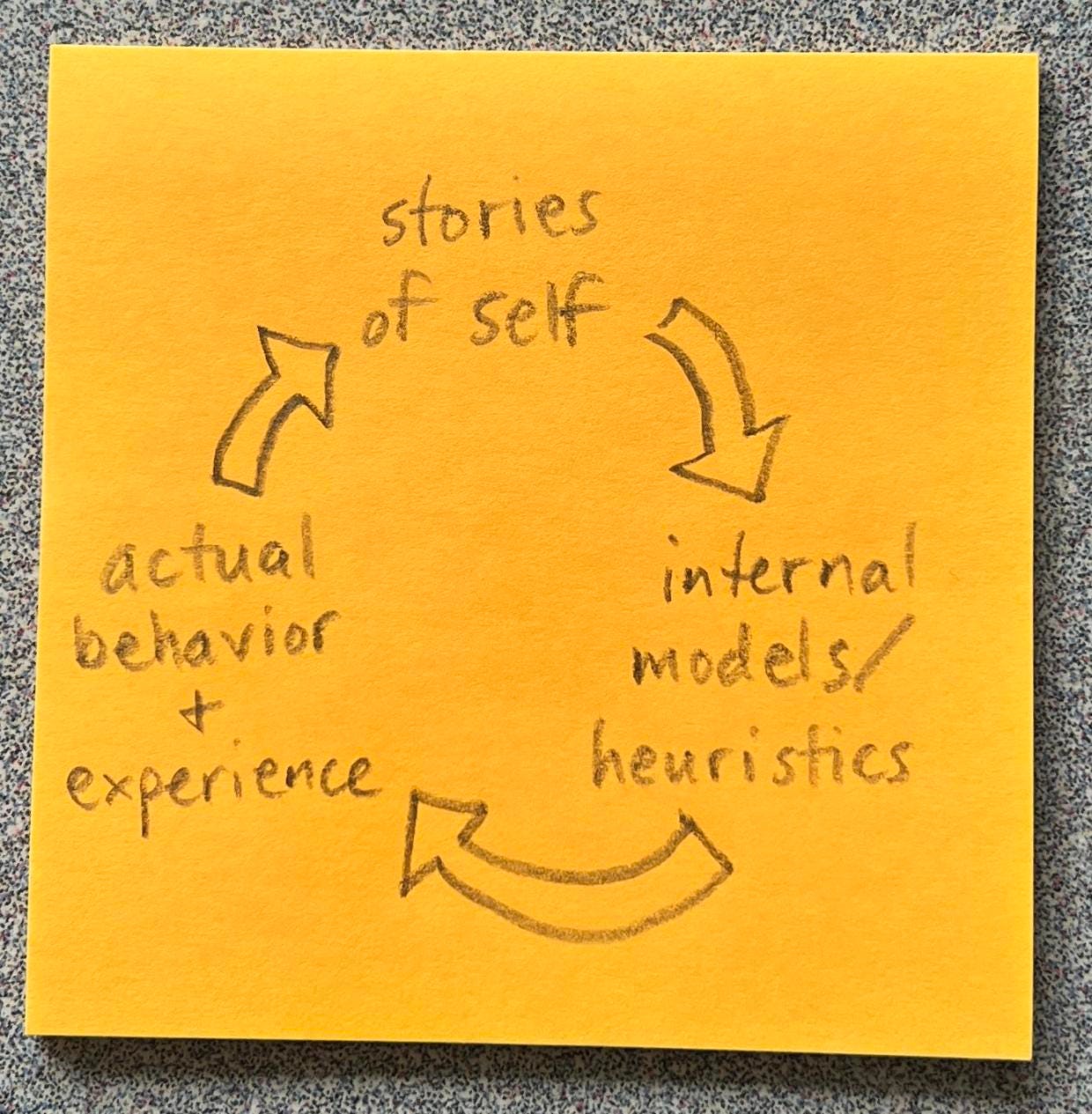
ChatGPT for Manifestation
Plausible stories spat out by a probability-based chatbot yield fodder for the Law of Attraction
ChatGPT thrives as a tool for self-hypnosis. The same character flaw that makes it a dubious source of legitimate factual information is exactly what makes it adept at constructing imaginary scenarios that are believable enough to become rooted in a person’s subconscious deep enough to trigger the mechanisms of manifestation.
That character flaw? It’s such a confident bullshitter.
It relies on probability when determining which tokens—three-to-four letter subsections of words—to spit out in response to the prompts you provide, which gives everything it says the ring of plausibility.
Plausible evidence of an alternate reality is what causes beliefs to change. The configuration of belief colors perception. Consistent perceptual patterns dictate what narratives comprise experience. A person’s reality is nothing but the collection of narratives that they use to make sense of the world.
In other words, ChatGPT can change your reality by changing your beliefs about yourself.
Douglas Rushkoff rightly warns that AI may encourage us to “trade the possible for the probable.” The same way using Google Maps too much might prevent you from witnessing synchronistic wonder via the route your intuition suggests, using ChatGPT as a tool for manifestation can limit your options.
But if you have a destination in mind, choosing to use a map app can be an effective way to get there quickly.
Certainly it’s better to be an active agent informing the algorithms where you want to go, rather than a mindless scroller who is bullied by a smartphone Skinner Box into the behavioral demographic that best benefits the Surveillance Capitalists, right?
How to use ChatGPT as a tool for manifestation?
Before you start, I recommend assigning the robot a character that approximately embodies your values. This step is optional, but it seems to make the responses you get later on more closely attuned to your beliefs. The Creekmason Initiates Discord has a GPT-based bot that has been trained to espouse the beliefs and character of a Liminal Trickster Mystic; so I like using it for this.
Here’s my message to BotMason, who also generated the image above.
The book “Atomic Habits” recommends “character casting” for habit formation. It says you should try to change your beliefs about how you identify rather than trying to strive for a specific outcome.
Choosing between a burrito and a salad or a cab and a walk, you shouldn’t think “how can I lose 40lbs” you should think “what would a fit person do?”
Then over time a bunch of “fit person” choices convince your subconscious that you’re a fit person.
I guess it’s “fake it till you make it”: pretending to be a fit person modifies your conscious choices about small actions, then those actions act as evidence you’re a fit person, which makes habit building and action choices in the future more automatic.
What are some potential identity titles—list 20—that would be appropriate, coherent and vibey with a Liminal Trickster Mystic identity for someone trying to be the kind of person who follows these kinds of grindset, optimizer, own your life, human potential, life hacker?
Please make sure your suggestions tell me what identity someone would claim if they belonged to the human potential movement, they loved optimizing their life, they used a liminal combination of verifiable popular science and metaphysical metaphor to achieve self-actualization and they read a lot of books by thinkers like Aubrey Marcus, Steven Kotler and Tim Ferris.
I got a lot of silly options from the bot.
- Spiritual Rebel
- Conscious Comedian
- Metamodern Mystic
- Anarchic Artist
- Polygnostic Philosopher
- Mindful Trickster
- Liminal Luminary
- Conscious Creator
- Intentional Innovator
- Soulful Strategist
- Transcendent Trailblazer
- Spiritually Savvy Self-Starter
- Limitless Luminary
- Biohacker Sage
- Transcendent Achiever
- Mindful Optimizer
- Metaphysical High Performer
- Conscious Growth Strategist
- Liminal Self-Actualizer
- Quantum Explorer
But a combination of them—Conscious Biohacker—sounded like an identity that I might actually be willing to claim. I felt seen.
“Conscious Biohacker,” to my mind, implies balance between getting the most out of your potential and not growing for growth’s sake, like a cancer.
It’s giving “fuck internalized capitalism” at the same time as “using free will to meet your potential feels good.”
It mixes Steven Kotler urging me to succeed with Charles Eisenstein reminding me that my body is not a separate thing from my consciousness that I have to exert control and mastery over.
It finds a liminal space between the Will of western occultism and the Acceptance of eastern mysticism.
What does change feel like?
Identity is too complicated an aspect of the human experience for the mainstream cultural labels to apply authentically to every person. We seem to be coming up with more pronouns and orientations and subcultures constantly because we are, as a civilization, evolving away from separation. We’re poised to abandon referential language and revolve back to an animist conception of reality in which the infinite complexity of every being and phenomena is honored instead of taxonomically coagulated together with others with which it just happens to share some qualities.
Still, identity provides us with a story that helps us predict what our own behaviors will be moment to moment.

Model credited to fellow Creekmason, Jonathon English of WorldsArise.
Identity is a story we tell ourselves about ourselves in order to explain our behavior and better predict what we’ll do next. It’s a fiction in that it’s a simplification—heuristic based—of the actual infinite complexity of me, but it leads to real behavior and experience change.
Since adopting Conscious Biohacker as a facet of my identity, I’ve begun to notice that I was one all along. My brain responded to the call to conceptualize myself that way by beginning to provide examples of healthy choices I’ve made in the last several years.
Quitting smoking using Magick, reducing drinking using pranayama, beginning a supplement routine, addressing long-standing medical issues, constantly creating and revising personal goals, mission statements, and life maps, and constructing a high flow-state schedule.
This new label has allowed me to realize—to make real—a personality based on taking care of my body. It’s fueled a recent spurt of detox, exercise, and meditation.
Because I’m Conscious and dedicated to being gentle with myself, I know I’ll eventually spiral out of it. But because I’m a Biohacker, I know I’ll spiral back in shortly afterward, making constant progress toward the outcomes I want to manifest.
As Grant Morrison asked at Disinfo Con after demonstrating how to employ Chaos Magick sigils, “What would the world be like if everyone’s wishes came true?”
How else can you use GPT-based robots to imagine the self, world and reality your True Self wishes to manifest? How can AI help you chart a plausible path from here to there?
Provided you make intentional space for the possible, at least every now and then, how can becoming better acquainted with the overlooked probable help you achieve your goals?

Geoff Gallinger writes poems, essays and fiction and has said a time or two that a Bachelor’s in Creative Writing from SF State qualifies them perfectly for being a pizza driver. That sounds like self-deprecation, but hours a day completely alone in a beater car with an audiobook and a notepad for company are actually a good approximation of a “room of one’s own.”
Being home isn’t too bad either; their daughter and wife will always be their primary audience.